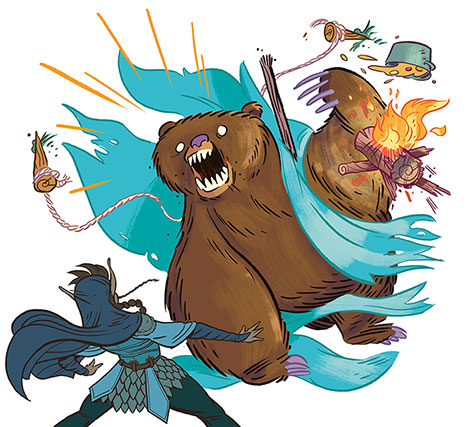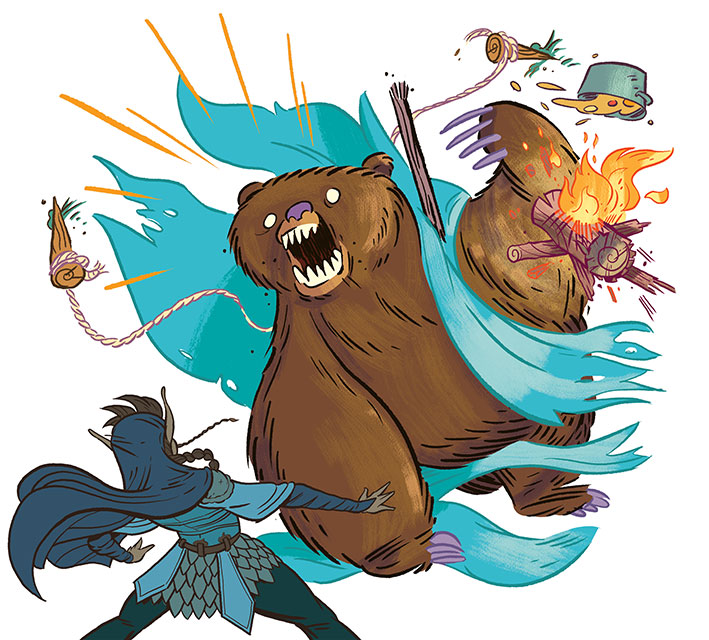Running the Game: Instant Action
- November 28, 2018
- Articles
- Posted by E. L. Thomas
- Comments Off on Running the Game: Instant Action
“ROLL INITIATIVE!” Those two simple words are all you need to get your players’ full attention. You start your game session right in the middle of the action. While the advice of starting in the middle is weird for eating a submarine sandwich, it works awesome for RPGs.
Follow me now, you have seen it many times on your favorite television shows and movies. The scene starts right in the middle of the action. It grabs your attention and your mind tries to make sense of what is going on. You are instantly engaged in the story. That same idea works for your game.
Begin your encounter by nonchalantly rolling a d20 and shooting an arrow at one of your players that deals them 6 damage. Even if it doesn’t hit their AC, it hits. Sure, it is kind of trolling behavior, but it gets their attention. After that, roll initiative and throw your PCs into a short combat or action scene. It gets things going with a bang and really engages your players as they scramble to try and catch up to your story.
You can’t use the old “never miss arrow trick” every time, but you can every two or three sessions or so start your game with Instant Action. It keeps your players on their toes, makes for memorable stories, gives great roleplaying opportunities, and is pretty fun. I’ll give you a few class-themed and possible group Instant Action Scenarios to help get you started on the path to rough-and-ready adventure.
Barbarian or Fighter—YOU KILLED MY BROTHER/SISTER/COUSIN/FATHER/MOTHER/DOG!: Perhaps the party’s barbarian or fighter did indeed kill someone’s brother/sister/cousin/father/mother/dog, or perhaps it is a case of mistaken identity. It matters not, because a rough thug or several are sure they did and wants payback. The “eye for an eye” kind of payback. This can take place in a tavern or open-air market, on the street, or pretty much anywhere the barbarian or fighter happens to be where there is a large crowd. The attackers should be of similar but lesser ability to the barbarian or fighter, though they should also be a challenge. One or more of the other characters could be with the barbarian or fighter when this encounter occurs. You could make it an ongoing theme, that every once in a while some new thug or group of thugs comes for revenge. You can modify the encounter for almost any class and have it include killing.
Bard—Angry Audience: Yell “BOOOOOO!” across the table as you roll 5d20s to determine if a hurled collection of rotted fruit, crockery, and other half-eaten food items hits as it rains down around your bard player’s character, as you start off the adventure with the bard in the midst of what appears to be not their best performance. Depending on how the bard reacts, either they win over the drunken crowd or things escalate into an all-out tavern brawl—perhaps roping in the other PCs (see the Barbarian/Fighter Scenario).
Cleric or Paladin—Begone, Foul Creature: Roll 1d20 as some lesser corporeal undead, spirit, or demonically possessed child lashes out at the cleric/paladin that is in the midst of trying to turn, banish, or slay it. Perhaps the cleric/paladin and some of the other characters are there to cleanse a tomb, graveyard, or shrine of evil creatures, and the game picks up right in the middle of it. They could be overwhelmed by a horde of the foul undead or lesser demons. It does make for a grim start to the evening’s gaming and might lead to deeper stories as the PCs uncover why they were even undertaking such an endeavor.
 Druid or Ranger—Don’t Feed the Bears: There is a very hungry and angry beast that comes rampaging straight into the druid’s or ranger’s camp. Have the druid or ranger and any other characters in the camp roll a death saving throw (10+ succeeds, less than 10 fails) to see if they are anywhere near prepared for such an event. Those that fail roll 1d10 and suffer the following setbacks while dealing with the bear.
Druid or Ranger—Don’t Feed the Bears: There is a very hungry and angry beast that comes rampaging straight into the druid’s or ranger’s camp. Have the druid or ranger and any other characters in the camp roll a death saving throw (10+ succeeds, less than 10 fails) to see if they are anywhere near prepared for such an event. Those that fail roll 1d10 and suffer the following setbacks while dealing with the bear.
- 1–2: Naked: for some reason you thought it was a good idea to sleep in the nude and now there is a bear coming at you. You must succeed at an Intelligence check DC 15 to remember where you left any of your gear.
- 3–4: Tangled in your bedroll: you must succeed at a Dexterity check DC12 or count as slowed and make all attack rolls at disadvantage because you are wrapped up in your blankets and bedroll.
- 5–6: Sound sleeper: you start the encounter prone, and if there is more than one PC in the encounter you must succeed at a Wisdom check DC 10 to awaken from sleep, unless you are attacked.
- 7–8: That’s my pack: when the encounter starts the bear (or beast) has already been at your pack and strewn all your gear about the camp. All food and drink are gone and 1d4 random items are missing.
- 9: It’s on my stuff: the bear (or beast) is currently standing atop of all your weapons and armor.
- 10: Mauled: the bear (or beast) makes 1 free attack on you with advantage for max damage if it hits.
Rogue—Stop Thief!: Roll 1d4 x50 gold pieces. That is how much coin is in the purse that ends up in the rogue’s hands at the beginning of this encounter. As the owner and a few dozen guards or thugs take notice of the PC, roll initiative because the chase is on. If the rogue manages to easily evade those following them, throw a few more thugs or guards cutting off their path to make it interesting. You might include a few other PCs in the encounter, or the whole encounter might be a case of mistaken identity—perhaps the real cutpurse tossed the easily identifiable and now empty purse into the PCs hands just before disappearing into the shadows or slipping into the crowd, leaving the PC to face the music for a crime they didn’t commit.
Sorcerer, Warlock, or Wizard—Surprise Spell Duel: Target the PC and their allies with an area effect spell that requires a saving throw. An upstart mage or former acquaintance/ally of the PC has come to prove their magic is more powerful than the PC’s, but isn’t foolish enough to make it fair. Start the encounter out with an impromptu spell duel with a magic user a bit less powerful than the PC; if more than one PC is present, add extra spell casters. It is up to how the PC reacts if the fight is to the death or not.
Instant Action doesn’t have to be dangerous, it could just be something fun. You could pick up your adventure right in the midst of a strong character in the middle of a test of strength—say arm wrestling with a massive barbarian woman. There could be a pile of money and bragging rights on the line and they are near losing. If another player laughs at the predicament you have thrust the arm-wrestling player into, just look at them and ask, “What are you laughing about? You bet [insert a sizable amount or coin or favorite possession] on your buddy to win!” I guarantee, at least those two players will be fully invested and most likely so will the rest of the table. Some of the others might even ask, “What is my character doing right now?” When that happens, you know you are doing it right!
I hope these give you a few ideas to use Instant Action in your own games. It is not only great fun and a surprise for your players, but it also encourages them to show up ready for game time.
 E.L. Thomas is a game designer, author, and rabid gamer who has been crawling through graph paper dungeons for nearly four decades and has no desire to stop. He lives with his two spoiled dogs under the auspicious grace of his queenly wife.
E.L. Thomas is a game designer, author, and rabid gamer who has been crawling through graph paper dungeons for nearly four decades and has no desire to stop. He lives with his two spoiled dogs under the auspicious grace of his queenly wife.


